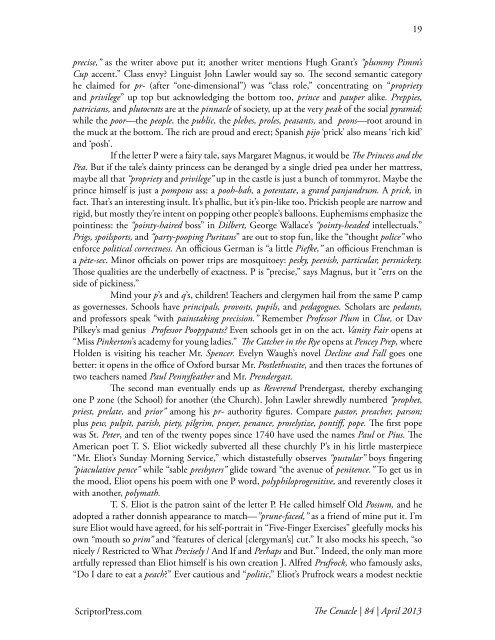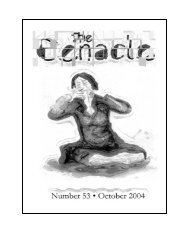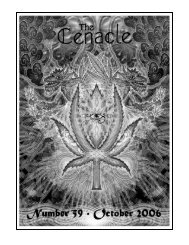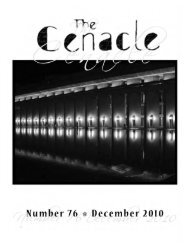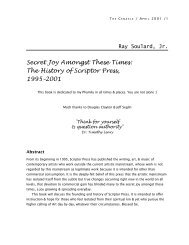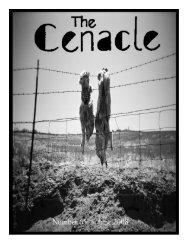Joe Ciccone - The ElectroLounge
Joe Ciccone - The ElectroLounge
Joe Ciccone - The ElectroLounge
You also want an ePaper? Increase the reach of your titles
YUMPU automatically turns print PDFs into web optimized ePapers that Google loves.
19<br />
precise,” as the writer above put it; another writer mentions Hugh Grant’s “plummy Pimm’s<br />
Cup accent.” Class envy Linguist John Lawler would say so. <strong>The</strong> second semantic category<br />
he claimed for pr- (after “one-dimensional”) was “class role,” concentrating on “propriety<br />
and privilege” up top but acknowledging the bottom too, prince and pauper alike. Preppies,<br />
patricians, and plutocrats are at the pinnacle of society, up at the very peak of the social pyramid;<br />
while the poor—the people, the public, the plebes, proles, peasants, and peons—root around in<br />
the muck at the bottom. <strong>The</strong> rich are proud and erect; Spanish pijo ‘prick’ also means ‘rich kid’<br />
and ‘posh’.<br />
If the letter P were a fairy tale, says Margaret Magnus, it would be <strong>The</strong> Princess and the<br />
Pea. But if the tale’s dainty princess can be deranged by a single dried pea under her mattress,<br />
maybe all that “propriety and privilege” up in the castle is just a bunch of tommyrot. Maybe the<br />
prince himself is just a pompous ass: a pooh-bah, a potentate, a grand panjandrum. A prick, in<br />
fact. That’s an interesting insult. It’s phallic, but it’s pin-like too. Prickish people are narrow and<br />
rigid, but mostly they’re intent on popping other people’s balloons. Euphemisms emphasize the<br />
pointiness: the “pointy-haired boss” in Dilbert, George Wallace’s “pointy-headed intellectuals.”<br />
Prigs, spoilsports, and “party-pooping Puritans” are out to stop fun, like the “thought police” who<br />
enforce political correctness. An officious German is “a little Piefke,” an officious Frenchman is<br />
a pète-sec. Minor officials on power trips are mosquitoey: pesky, peevish, particular, persnickety.<br />
Those qualities are the underbelly of exactness. P is “precise,” says Magnus, but it “errs on the<br />
side of pickiness.”<br />
Mind your p’s and q’s, children! Teachers and clergymen hail from the same P camp<br />
as governesses. Schools have principals, provosts, pupils, and pedagogues. Scholars are pedants,<br />
and professors speak “with painstaking precision.” Remember Professor Plum in Clue, or Dav<br />
Pilkey’s mad genius Professor Poopypants Even schools get in on the act. Vanity Fair opens at<br />
“Miss Pinkerton’s academy for young ladies.” <strong>The</strong> Catcher in the Rye opens at Pencey Prep, where<br />
Holden is visiting his teacher Mr. Spencer. Evelyn Waugh’s novel Decline and Fall goes one<br />
better: it opens in the office of Oxford bursar Mr. Postlethwaite, and then traces the fortunes of<br />
two teachers named Paul Pennyfeather and Mr. Prendergast.<br />
<strong>The</strong> second man eventually ends up as Reverend Prendergast, thereby exchanging<br />
one P zone (the School) for another (the Church). John Lawler shrewdly numbered “prophet,<br />
priest, prelate, and prior” among his pr‐ authority figures. Compare pastor, preacher, parson;<br />
plus pew, pulpit, parish, piety, pilgrim, prayer, penance, proselytize, pontiff, pope. <strong>The</strong> first pope<br />
was St. Peter, and ten of the twenty popes since 1740 have used the names Paul or Pius. <strong>The</strong><br />
American poet T. S. Eliot wickedly subverted all these churchly P’s in his little masterpiece<br />
“Mr. Eliot’s Sunday Morning Service,” which distastefully observes “pustular” boys fingering<br />
“piaculative pence” while “sable presbyters” glide toward “the avenue of penitence.” To get us in<br />
the mood, Eliot opens his poem with one P word, polyphiloprogenitive, and reverently closes it<br />
with another, polymath.<br />
T. S. Eliot is the patron saint of the letter P. He called himself Old Possum, and he<br />
adopted a rather donnish appearance to match—”prune-faced,” as a friend of mine put it. I’m<br />
sure Eliot would have agreed, for his self-portrait in “Five-Finger Exercises” gleefully mocks his<br />
own “mouth so prim” and “features of clerical [clergyman’s] cut.” It also mocks his speech, “so<br />
nicely / Restricted to What Precisely / And If and Perhaps and But.” Indeed, the only man more<br />
artfully repressed than Eliot himself is his own creation J. Alfred Prufrock, who famously asks,<br />
“Do I dare to eat a peach” Ever cautious and “politic,” Eliot’s Prufrock wears a modest necktie<br />
ScriptorPress.com<br />
<strong>The</strong> Cenacle | 84 | April 2013


